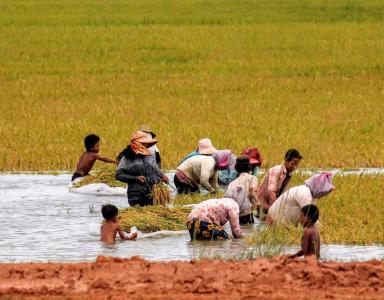នាយកដ្ឋាន
សេដ្ឋកិច្ចបៃតង
ព័ត៌មានបន្ថែមអំពី សេដ្ឋកិច្ចបៃតង
The green economy means "one that results in improved human well-being and social equity, while significantly reducing environmental risks and ecological scarcities. It is low carbon, resource efficient, and socially inclusive" (UN Environment, 2011).
It has been known as a key pathway to achieve the sustainable development in which three dimensions are significantly to be accomplished:
- Economy : high dependency on natural resources for growth and livelihoods in key sectors such as agriculture, forests, fisheries, tourism, transport, urban development, mining, and national, regional and international trade and integration
- Society: population and demographic change, cultural factors, governance structure that influences the way to address the environment and sustainability issues. Additionally, appropriate and acceptable technologies that work to support the society’s objectives in natural resources management and environment sustainability
- Environment: climate change, extreme weather events, environmental changes that add more pressure on environmental quality and threats to availability and accessibility of natural resources
អាណត្តិ
Prepare legal documents, policies, strategic plans, plan and budget plan for
- Coordinate and implement legal documents, policies, strategic plan, action plan, programme and project for supporting the green economy pathway as well as monitoring and evaluation and annual report
- Coordinate research in related impacts and benefits of development activities to economy, environment, society and culture
- Coordinate natural capital accounting and measure green domestic products
- Coordinate the feasibility study and establish pollution pay principle mechanism and payment for environmental service and coordinate, monitoring and evaluate the implementation of agreed mechanism
- Coordinate research and establishing supporting tool system for decision making such as impact assessment, multicriterial analysis, cost-benefit analysis to contribute to modification or establishment of legal documents, policies, strategic plan, action plan, programme and projects.
- Research and develop policies and mechanisms related to sustainable consumption and production such as green label certification, green public procurement, green certification and montiroing and evaluation of the agreed mechanism.
- Build and strengthen cooperation with partners, civil society organization, private sector, academic institute and other stakeholders to promote green economy development
- Disseminate and mobilsing resources for the implementation of agreed policies
Green Investment Delivers Growth in Cambodia (En)1.85 MB
Phnom Penh Green Strategic Plan3.84 MB
Green City Strategic Plan Methodology (En)3.04 MB
Green City Strategic Plan Methodology (Kh)3.05 MB
National Policy on Green Growth (En)196.45 KB
National Policy on Green Growth (Kh)6.73 MB
National Strategic Plan on Green Growth (En)895.19 KB
National Strategic Plan on Green Growth (Kh)9 MB
The National Green Growth Roadmap (En)1.21 MB
Video of Green Urban Development Program in Cambodia134.23 MB

